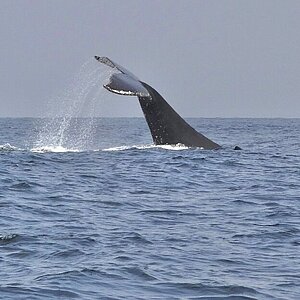Save the Blue Five – Regional approach to protect migratory marine megafauna in the Southeast Pacific Region (SEPR)
The five species groups - whales, dolphins, sharks, sea turtles and manta rays - known as the Blue Five, are of outstanding biodiversity value and are particularly vulnerable due to their dependence on transboundary habitats. The project therefore takes a regional approach to improve their chances of survival. It strengthens the policy framework for the conservation and sustainable use of marine megafauna and promotes the implementation of coordinated measures. These include coordinated transnational conservation actions, a common monitoring system, improved science-policy interfaces, public-private financing mechanisms, capacity building and awareness raising. To achieve its objectives, the project promotes regional dialogue and cooperation among countries and stakeholders within the framework of the Permanent Commission for the South Pacific, as well as cooperation between policy and science.
- Countries
- Chile, Colombia, Costa Rica, Ecuador, Panama, Peru
- IKI funding
- 19,500,000.00 €
- Included preparation phase
- 500,000.00 €
- Duration
- 02/2023 till 01/2028
- Status
- open
- Implementing organisation
- Deutsche Gesellschaft für Internationale Zusammenarbeit (GIZ) GmbH
- Political Partner
-
- Ministry of Environment, Water and Ecological Transition (MAATE)
- Ministry of Environment (MINAM) - Peru
- Ministry of Environment and Energy (MINAE) - Costa Rica
- Ministry of Environment and Sustainable Development (MinAmbiente) - Colombia
- Permanent Commission for the South Pacific (CPPS)
- Implementing Partner
-
- Conservation International (CI)
- MarViva Foundation
- Permanent Commission for the South Pacific (CPPS)
- Online
State of implementation/results
- Two regional action plans on marine protected areas and marine turtles of the Permanent Commission for the Southeast Pacific (CPPS) are being updated.
- A regional ocean conference called Encuentro del Pacífico Sudeste: Comprometidos por un océano sostenible (Meeting of the Southeast Pacific: Committed to a sustainable ocean) was held in November 2024. This event brought together environmental experts, non-governmental organizations, and members of the public and private sectors from Costa Rica, Panama, Colombia, Ecuador, Peru and Chile. The aim was to foster regional collaboration and share knowledge, experiences and good practices for the protection of key marine species such as whales, dolphins, sharks, sea turtles, and manta rays.
- Several side events and dialogue sessions were held at international conferences, such as the Interamerican Turtle Convention (Ecuador), the International Whale Commission (Perú), the COP on Biological Diversity (Colombia) and the Immersed in Change Conference (Costa Rica).
- CPPS signed a Memorandum of Understanding with the Interamerican Turtle Convention and the International Whale Commission to foster international collaboration on species conservation such as the joint development of manuals or species release activities.
- A letter of support for a GEF-sponsored project focusing on the Eastern Tropical Pacific Marine Corridor (CMAR) was signed. The collaboration between the two projects focuses on (a) governance, (b) regional corridor management, (c) regional blue economy, and (d) regional communications, knowledge management, and learning. A collaboration agreement between CMAR and Save the Blue Five is set up.
- Ten species for regionally standardized monitoring efforts have been defined among partner countries: Green Turtles, Hawksbill Turtles, Leatherback Turtles, Humpback Whales, Bottlenose and Pantropical Spotted Dolphins, Whale Sharks, Hammerhead Sharks, Silky Sharks and Giant Manta Rays.
- Training workshops on Sustainable Blue Economy for representatives of the industrial fishing sector, Data Management for Marine Protected Areas staff and Species Release Methods for local communities were held in Colombia, Ecuador and Perú.
- An exchange between Island Marine Protected Areas led to the "Declaratoria de Hermandad" (Declaration of Brotherhood) between Galápagos, the Archipelago of Juan Fernández and Rapa Nui with the intention to intensify the exchange of best practices on common challenges such as governance, marine debris and sustainable tourism and fisheries.
- Five private sector companies and small-scale community businesses qualified themselves for financial support in an award-based competition. They are being supported in strengthening the conservation and sustainable management of migratory marine megafauna, ensuring coastal sustainable livelihoods.
- A competitive fund (ProCompite) was set up by the municipality of Pisco with the aim to promote business models that combine environmental protection with local economic development.
- A regional awareness-raising campaign, based on scientific data and linked to everyday actions to create simple stories, is set up. Messages contain informative facts, appeal to emotions, and call for action for all stakeholders.
- An online library was built and seeks to centralize knowledge on the conservation of marine megafauna in the Southeast Pacific, facilitating access to documents, books and scientific articles through the Open Access initiative.
- The communication and capacity development strategies of the project are set up, including social media channels (Instagram, LinkedIn, YouTube).
Latest Update:
04/2025
Project relations
Legend:
The link has been copied to the clipboard





